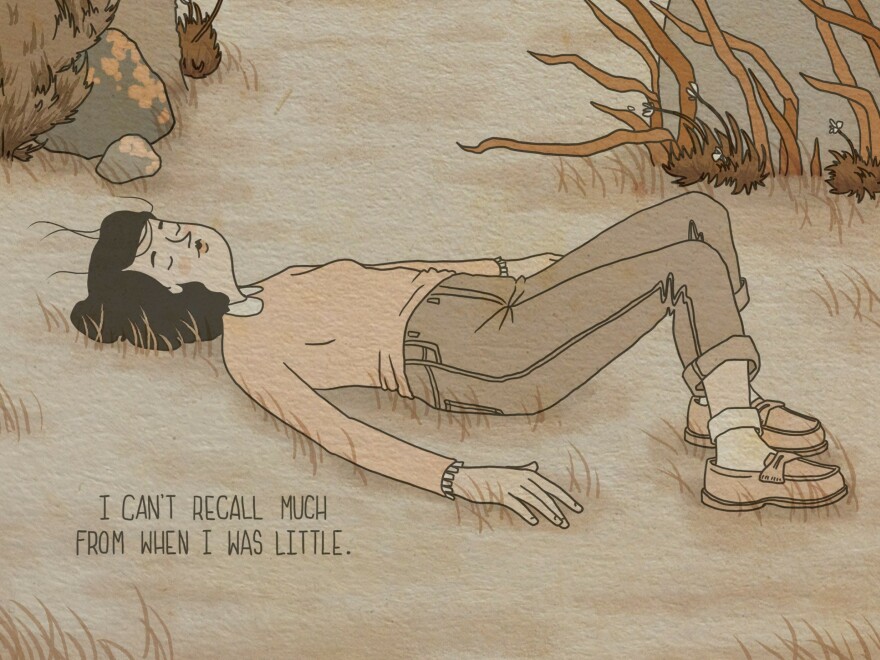This story is free to read because readers choose to support LAist. If you find value in independent local reporting, make a donation to power our newsroom today.
Mostly through images, a daughter grieves her mother in 'Ephemera'

Briana Loewinsohn's debut Ephemera opens with images of a casually dressed middle-aged woman standing in deep contemplation amidst tall, stately trees.

Eventually, she is pictured lounging on the ground where she initially stood, eyes tightly closed, fingers reaching into strands of grass that carry her, through touch, far back into her past. "I can't recall much from when I was little," the text states.
On the following page, in a mirroring illustration, a young girl can be seen sprawling in the grass, her dark hair, Peter Pan collar, and reaching hands near duplications of the stretched-out adult.
Falling somewhere between a picture book and a graphic novel, Loewinsohn's memoir offers a fulsome emotional landscape glimpsed in tonally understated hues and wordless, or else lightly worded, scenes. It's a quiet, lonely read that vacillates between images of a middle-aged woman tending lovingly to an abandoned garden in the "present" of the storyline, and the memories that visit her from a mostly solitary childhood lived out in a similar landscape. The book's dedication — "For my mum and other things that were not built to last" — serves as an evocative prelude to a book in which a daughter grieves a mother who was largely absent even before her death.
Though few concrete details are offered up in this subtle, elegant tale of childhood trauma and resilience, what becomes clear is that a young girl, and her somber, disconsolate sibling, grew up with a mother who struggled with a serious and debilitating mental illness. In the few early scenes in which the mother is pictured, she is depicted through a pane of glass or across a threshold. The daughter cannot access a ghostly presence that is nearly always at a distance. Her longing — for connection, for touch — is nonetheless apparent in every plant leaf she strokes, every seedling she concentrates on, waiting, first as a child, later as an adult, to see if she can apprehend its growth.

Loewinsohn's inspired book is less a reckoning, more a kind of love letter — if a convoluted one — to this mother. Addressed as "you" throughout, she is remembered as an essential, looming figure, the one who transmitted to her daughter an enduring love for the outdoors and nature, for gardening and planting. Divided into three sections, "Dirt," "Leaf," and "Light," the grown-up daughter is now skilled at the only occupation that seemed to animate her troubled loved one. As a child she was unintentionally taught to wait, and wait, for a presence (her mother) that might reappear at any moment, then disappear again without warning. In this way, Ephemera discloses how even something that is learned with oppressive difficultly at an early age can hold value in other contexts later on. Patience, staying, careful attention: These are a gardener's most effective tools.
Towards the end of the book, an imagined conversation between mother and daughter, a reunion and reconciliation of sorts, is an important reminder. The fantastical exchange demonstrates how the imagination can help forge, or resurrect, threads of attachment, even for people, or places, long departed. Imagination is, in fact, a constructive mechanism for grieving.
Like some of the most powerful wordless picture books and graphic novels — from Shaun Tan's pioneering The Arrival to Daishu Ma's Leaf, Guojing's The Only Child, or even Sara Varon's lighter Robot Dreams, Ephemera manages to present a fully developed internal, and external, landscape without leaning heavily on words. It's a sophisticated and picturesque exploration of the weights that adults carry with them from their childhoods, imprints and encumbrances that accompany them wherever they go. It's a reminder, too, of how people can reshape these burdens, using art and inventiveness to realign the past in relation to the present.
Tahneer Oksman is a writer, teacher, and scholar specializing in memoir as well as graphic novels and comics. She lives in Brooklyn, NY.
Copyright 2023 NPR. To see more, visit https://www.npr.org. 9(MDA1OTI3MjQ5MDEyODUwMTE2MzM1YzNmZA004))







